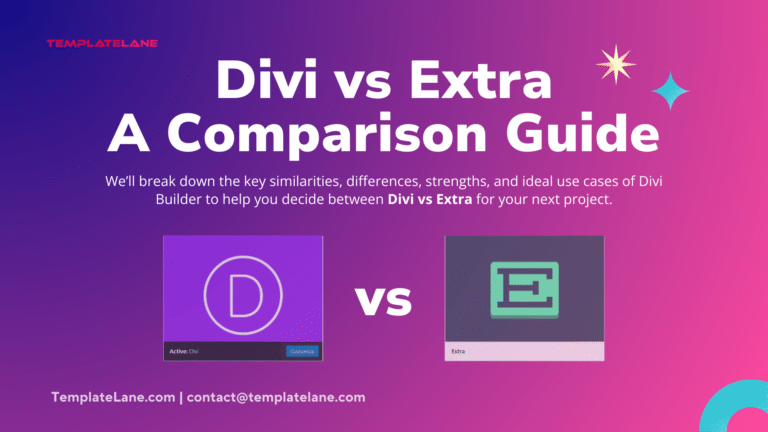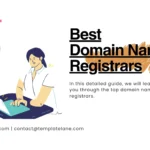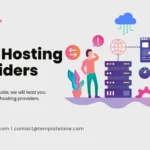Limited Time Offer 👉 Get 58% off Divi AI with the Divi Pro.
Best Domain Name Registrars in 2025
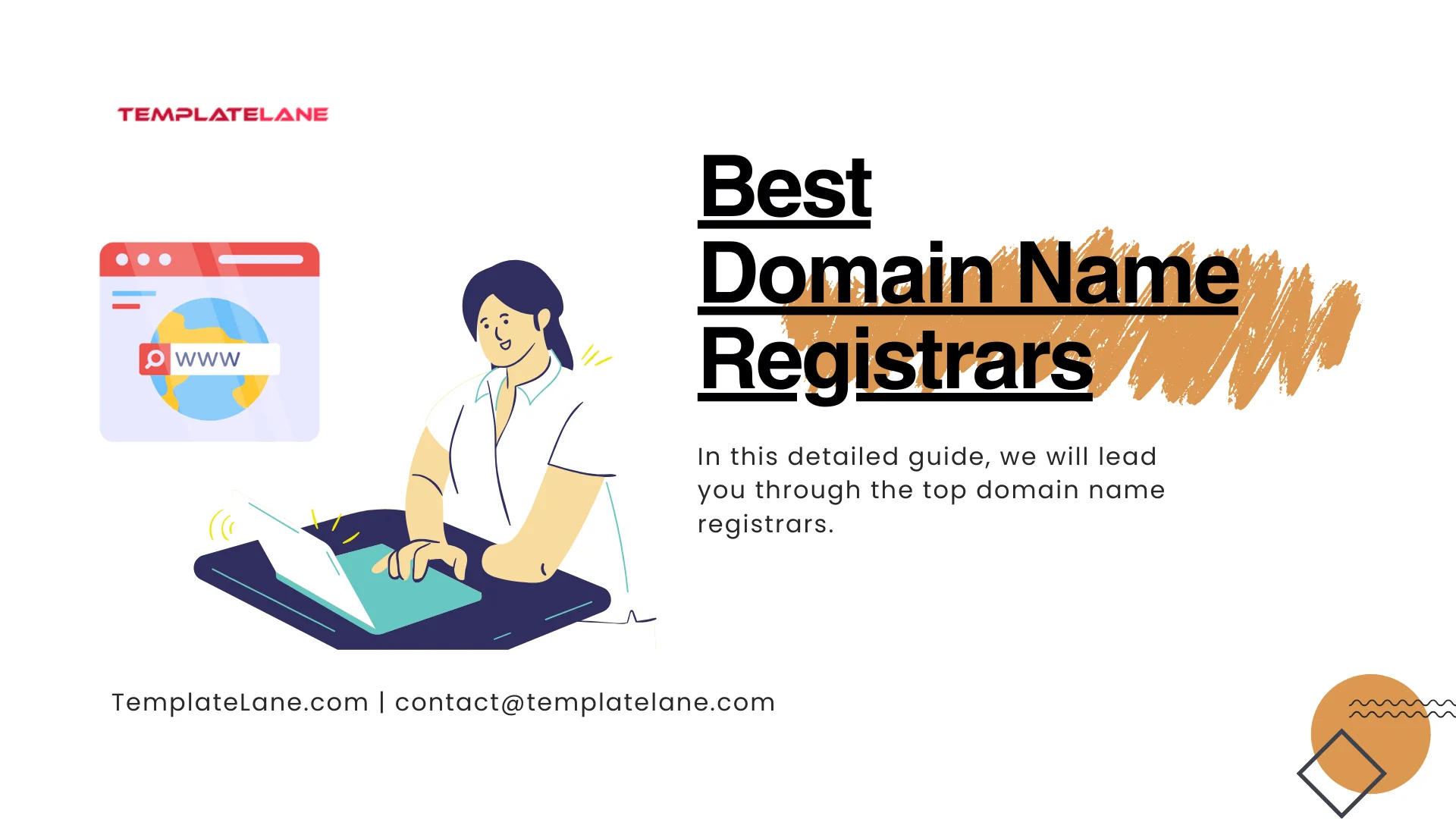
Choosing the right domain name registrar is crucial for anyone looking to establish a presence on the web. Whether you’re starting a blog, launching a business website, or creating a personal portfolio, the domain registrar you choose can significantly impact your online success. In 2025, the options for domain registrars are vast, each offering unique features, pricing structures, and customer service levels. This guide aims to provide an in-depth look at the Best Domain Name Registrar currently available, helping you make an informed decision based on your specific needs.
We cannot really purchase a domain name. We simply register it and get it on lease for a specific period, like 1 year, 2 years (up to 10 years). After this time is up, we need to pay a renewal amount in order to keep our domain registration alive. If this amount is not paid, we lose the ownership of the domain and it is free to be purchased by anyone on the Internet!
Several companies have ventured into offering lifetime domain registrations with a one-time registration fee, albeit with varying terms and conditions.
If you have ever searched for a domain name, you might’ve also come across a term called domain extension. The price of your domain name entirely depends on the extension.
Let’s get started!
What is a Domain Name Registrar?
A Domain Name Registrar is a company or organization accredited by the Internet Corporation for Assigned Names and Numbers (ICANN) to sell and manage the registration of domain names. Domain names are human-readable addresses (like www.example.com) used to access websites on the Internet. Registrars provide services that allow individuals and organizations to register and maintain these domain names, ensuring they are unique and pointing to the correct web servers.
Key Functions of a Domain Name Registrar:
- Registration Services: Registrars allow customers to search for available domain names and register them for a specified period, typically ranging from one to ten years.
- DNS Management: They offer tools to manage Domain Name System (DNS) records, which control how domain names are mapped to IP addresses.
- Renewal and Transfer Services: Registrars provide options for renewing domain registrations and transferring domains from one registrar to another.
- Domain Privacy Protection: Many registrars offer WHOIS privacy services, which hide the registrant’s personal information from public WHOIS databases.
- Technical Support: They provide customer support to assist with domain-related issues, such as DNS configuration and website setup.
How Domain Name Registrars Work?
- Accreditation: To become a registrar, a company must be accredited by ICANN or a regional internet registry (such as ARIN, RIPE NCC, APNIC, LACNIC, or AFRINIC).
- Interaction with Registry: Registrars interact with domain registries (organizations managing the top-level domains, such as .com, .org, .net) to register and manage domains. Registries maintain the central database of all domain names and their corresponding information.
- User Interface: They provide an online interface where users can search for, purchase, and manage their domain names.
What is Domain Extensions?
Domain extensions, also known as top-level domains (TLDs), are the last part of a domain name, appearing after the final dot. They help classify domain names by their purpose, region, or organization type.
Here’s an overview of the different types of domain extensions:
- Generic Top-Level Domains (gTLDs): These are the most common type of TLDs and are not tied to any specific country or region.
- .com – Originally intended for commercial businesses but now widely used by all types of entities.
- .org – Primarily used by non-profit organizations.
- .net – Originally for network-related entities like internet service providers but now used by many types of organizations.
- .info – Intended for informational websites.
- .biz – For business or commercial use.
- .name – For personal use, such as personal blogs or websites.
- .edu – Reserved for educational institutions.
- .gov – Reserved for governmental entities in the United States.
- .mil – Reserved for the United States military.
- Country Code Top-Level Domains (ccTLDs): These are two-letter domain extensions assigned to countries or territories.
- .us – United States
- .uk – United Kingdom
- .ca – Canada
- .de – Germany
- .fr – France
- .cn – China
- .jp – Japan
- .in – India
- Sponsored Top-Level Domains (sTLDs): These are specialized TLDs that are sponsored by specific organizations or communities.
- .aero – For the air transport industry.
- .coop – For cooperatives.
- .museum – For museums.
- .jobs – For employment-related sites.
- .mobi – For mobile-compatible sites.
- .travel – For travel and tourism industry.
- Infrastructure Top-Level Domain: Infrastructure Top-Level Domain.
- .arpa – Used for technical infrastructure purposes (Address and Routing Parameter Area).
- New Generic Top-Level Domains (New gTLDs): Introduced to expand the available domain name space, these can include virtually any term or phrase and often target specific industries, interests, or communities.
- .app – For applications.
- .blog – For blogs.
- .shop – For e-commerce and online stores.
- .tech – For technology-related sites.
- .xyz – A generic extension used for a variety of purposes.
- .guru – For expert sites.
- .club – For clubs and communities.
- Internationalized Domain Names (IDNs): These use non-ASCII characters and allow domain names in various native languages and scripts.
- .中国 (China)
- .рф (Russia)
- .भारत (India)
- Second-Level Domains: Some domains are structured to have an additional layer of categorization under a TLD, especially common in the United Kingdom and Japan.
- .co.uk – Commercial entities in the United Kingdom.
- .ac.uk – Academic institutions in the United Kingdom.
- .gov.uk – Governmental entities in the United Kingdom.
- .co.jp – Commercial entities in Japan.
- .ac.jp – Academic institutions in Japan.
These various domain extensions offer a wide range of choices for website owners, allowing them to select the most appropriate extension based on their location, industry, or purpose.
Factors for Selecting the Right Domain Name Registrar:
Selecting the right domain name registrar is a crucial decision for anyone looking to establish an online presence. In this guide, “Best Domain Name Registrars” we have listed down several key factors that we should consider when choosing a domain name registrar:
- Domain Name Management Features:
- WHOIS Privacy: Check if WHOIS privacy protection is included or available at a reasonable cost to protect your personal information.
- Control Panel: A user-friendly and intuitive control panel is essential for managing your domains efficiently.
- DNS Management: Ensure the registrar provides robust DNS management tools, including the ability to edit DNS records.
- Security Features:
- SSL Certificates: Consider whether the registrar offers SSL certificates to secure your website.
- Two-Factor Authentication: Look for registrars that provide two-factor authentication to enhance account security.
- Registrar Lock: Ensure they offer a domain lock feature to prevent unauthorized domain transfers.
- Add-On Services:
- Hosting Services: Some registrars offer bundled web hosting services, which can be convenient.
- Email Services: Check if they provide email hosting or email forwarding services.
- Website Builder: Some registrars offer website builders, which can be useful for beginners.
- Registrar Reputation:
- Trustworthiness: Choose a registrar with a solid reputation and long-standing presence in the industry.
- Reviews and Ratings: Read customer reviews and ratings on independent platforms to gauge overall satisfaction.
- Accreditations: Ensure the registrar is ICANN-accredited, which indicates they meet certain standards.
- Domain Name Transfer Policies:
- Ease of Transfer: Check the policies and fees associated with transferring your domain to another registrar if needed.
- Lock-in Periods: Some registrars may have lock-in periods or restrictions on transferring domains shortly after purchase.
- Bulk Domain Name Services:
- Bulk Registration: If you need to register multiple domains, look for registrars that offer bulk registration discounts.
- Bulk Management: Ensure the registrar provides tools for managing multiple domains easily.
- International Domain Name Support:
- TLD Variety: Check if the registrar offers a wide range of top-level domains (TLDs), including country-specific ones.
- Language Support: For international users, it’s beneficial if the registrar provides customer support in multiple languages.
- Customer Support:
- Availability: Look for registrars that offer 24/7 customer support.
- Support Channels: Multiple support channels (email, phone, live chat) can be beneficial.
- Reputation: Research reviews and testimonials about the registrar’s customer support responsiveness and effectiveness.
- Domain Name Pricing and Value:
- Registration Fees: Compare the costs of domain registration across different registrars. Some offer lower initial prices but may have higher renewal fees.
- Renewal Rates: Check the renewal rates and ensure they are reasonable. Some registrars offer low introductory prices but significantly higher renewal costs.
- Additional Costs: Be aware of any hidden fees for services such as domain transfers, WHOIS privacy, or SSL certificates.
- Cancellation and Refund Policies:
- Refund Policy: Understand the registrar’s refund policy in case you change your mind shortly after purchase.
- Cancellation Terms: Review the terms and conditions related to domain cancellations.
1. Namecheap
Namecheap is a well-established domain name registrar and web hosting company founded in 2000. Known for its affordability and user-friendly interface, Namecheap has garnered a loyal customer base. Namecheap is a reliable and cost-effective option for domain name registration and management. The company offers a wide range of services, including domain registration, web hosting, SSL certificates, and more.
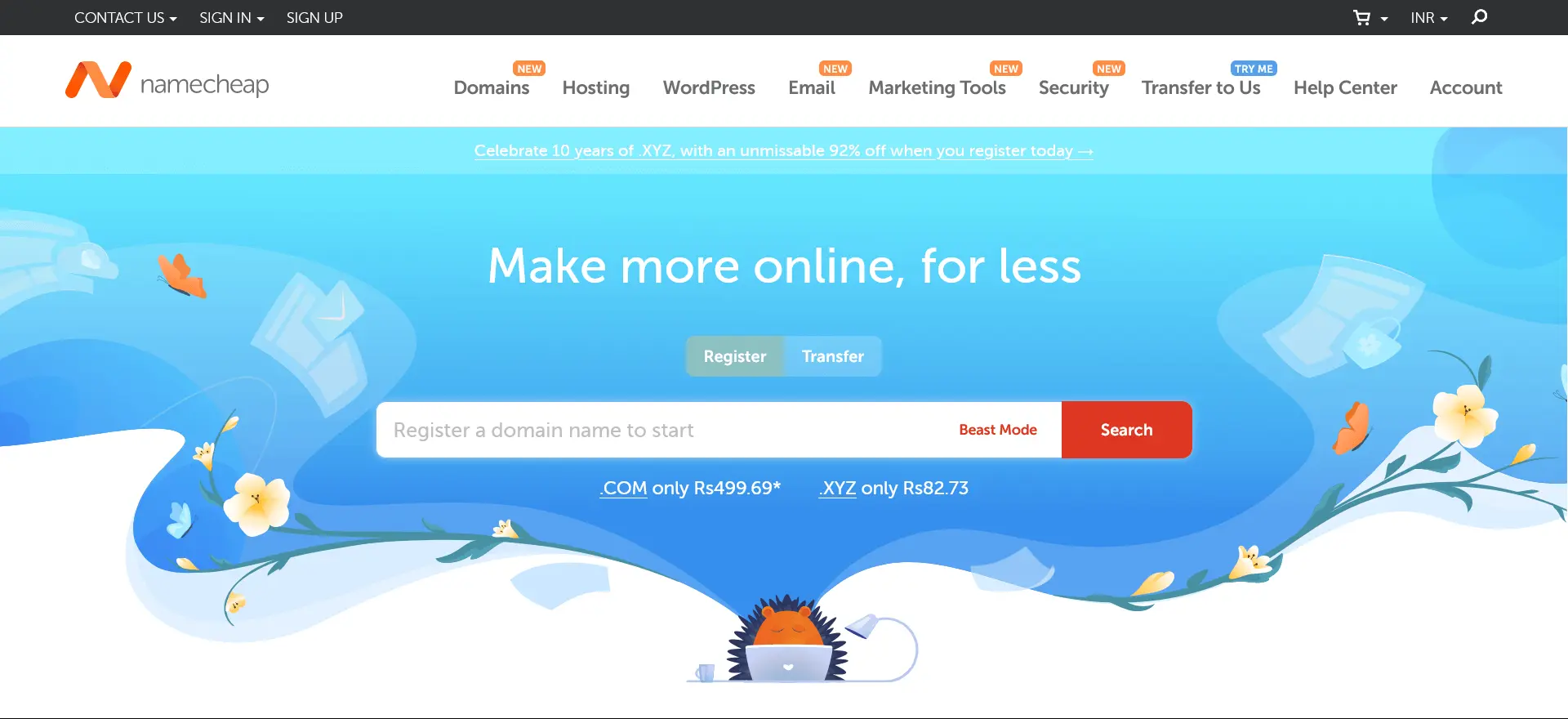
| TLDs | New Domain Price | Renewal Price |
| .com | $10.28 | $13.98 |
| .in | $7.98 | $9.98 |
| .org | $7.48 | $12.98 |
| .net | $12.98 | $14.98 |
| .xyz | $0.99 | $12.98 |
- Affordable Pricing: One of the most significant advantages of Namecheap is its competitive pricing. The cost of domain name registration is often lower than many competitors, and they frequently offer promotions and discounts, making it an attractive option for budget-conscious users.
- User-Friendly Interface: Namecheap’s platform is designed with ease of use in mind. The user-friendly interface simplifies the process of searching for, registering, and managing domains. Even those with little to no technical expertise can navigate the site with ease.
- Free WHOIS Privacy Protection: Namecheap includes free WHOIS privacy protection with domain name registration. This service masks your personal information in the WHOIS database, protecting you from spam and potential identity theft.
- Excellent Customer Support: Customer support is a critical factor in choosing a domain name registrar, and Namecheap excels in this area. They offer 24/7 customer support through live chat and ticketing systems, ensuring that help is available whenever you need it.
- Wide Range of TLDs: Namecheap provides a vast selection of top-level domains (TLDs) to choose from, including popular options like .com, .net, and .org, as well as newer, more niche TLDs. This variety allows users to find the perfect domain for their needs.
- Easy Domain Management: Managing your domains with Namecheap is straightforward. Their control panel allows you to update DNS settings, renew domains, and transfer domains with minimal hassle. They also offer bulk domain name management for those with multiple domains.
- Add-On Services: In addition to domain name registration, Namecheap offers a range of add-on services, such as web hosting, SSL certificates, and professional email services. These additional features make Namecheap a one-stop shop for building and maintaining an online presence.
- Upselling: While Namecheap’s low prices are appealing, the company does engage in upselling. During the checkout process, users may encounter multiple offers for additional services, which can be overwhelming for some.
- Renewal Rates: Although initial registration prices are low, renewal rates can be significantly higher. It’s essential to be aware of these costs when budgeting for your domain in the long term.
- Limited Phone Support: Namecheap primarily offers support through live chat and ticketing. While these options are generally effective, some users may prefer the immediacy of phone support, which is not available.
- Occasional Performance Issues: Some users have reported occasional performance issues with Namecheap’s hosting services, such as slower load times or downtime. While not a common problem, it’s something to consider if you plan to use their hosting services extensively.
2. Dynadot
Dynadot is a domain name registrar and web hosting company founded in 2002. Over the years, it has grown to become a trusted name in the industry. It stands out as a reputable and user-friendly option, also known for its straightforward pricing, user-friendly interface, and robust customer support. Dynadot offers a wide range of services including domain name registration, website hosting, email hosting, and a website builder.
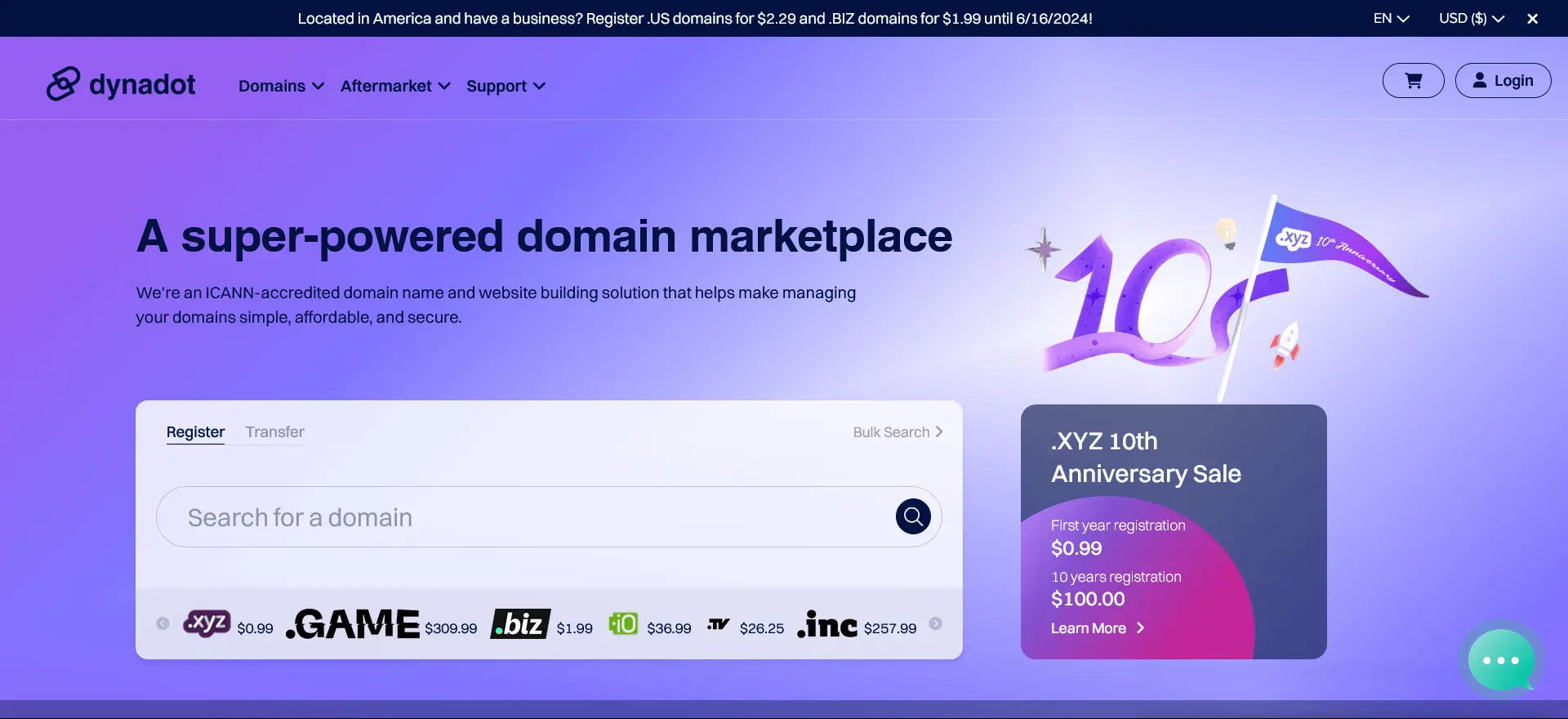
| TLDs | New Domain Price | Renewal Price |
| .com | $10.19 | $10.19 |
| .in | $5.99 | $5.99 |
| .org | $7.88 | $10.50 |
| .net | $12.50 | $12.50 |
| .xyz | $0.99 | $10.99 |
- User-Friendly Interface: Dynadot’s platform is designed with simplicity in mind. The clean, intuitive interface makes it easy for users to navigate, register domains, and manage their settings without needing extensive technical knowledge.
- Competitive Pricing: Dynadot offers competitive pricing on domain registrations, renewals, and transfers. They frequently run promotions and discounts, making it an affordable option for both new and existing users.
- Wide Range of TLDs: With a vast selection of top-level domains (TLDs) available, including popular ones like .com, .net, and .org, as well as numerous country-specific and niche options, Dynadot provides flexibility for finding the perfect domain name.
- Robust Security Features: Dynadot takes security seriously. Features like two-factor authentication (2FA), domain privacy protection, and DNSSEC are available to help safeguard your domain and personal information.
- Excellent Customer Support: Users often praise Dynadot for its responsive and helpful customer support. Whether through email, live chat, or phone, the support team is known for addressing issues promptly and effectively.
- Advanced Domain Management Tools: Dynadot offers a suite of advanced tools, including DNS management, email forwarding, and website builders. These tools cater to both beginners and advanced users looking to customize their domain setup.
- Learning Curve for Advanced Features: While the basic features are user-friendly, some of the more advanced tools and settings can have a steeper learning curve. Users new to domain name management might find these features somewhat overwhelming at first.
- Limited Hosting Options: Unlike some competitors, Dynadot’s hosting options are relatively limited. They focus primarily on domain registration and management, so users looking for comprehensive hosting solutions might need to look elsewhere or integrate with third-party hosting services.
- Occasional Pricing Fluctuations: Although Dynadot offers competitive pricing, there can be occasional fluctuations, especially for premium domains and during promotional periods. It’s essential to keep an eye on pricing changes to avoid unexpected costs.
- Interface Customization: While the interface is generally praised for its simplicity, it lacks extensive customization options. Users looking for a highly tailored dashboard experience might find this limiting.
- No 24/7 Support: Although their customer support is highly regarded, it is not available 24/7. This can be a drawback for users in different time zones or those who encounter issues outside of regular business hours.
3. NameSilo
NameSilo has carved a niche for itself by offering competitive prices and a range of features that appeal to both individual and business users. NameSilo is an excellent choice for those looking for affordable and reliable domain name registration services. Their transparency, free WHOIS privacy, and user-friendly interface make them a favorite among many users. Ultimately, the best domain registrar for you will depend on your specific needs and priorities.
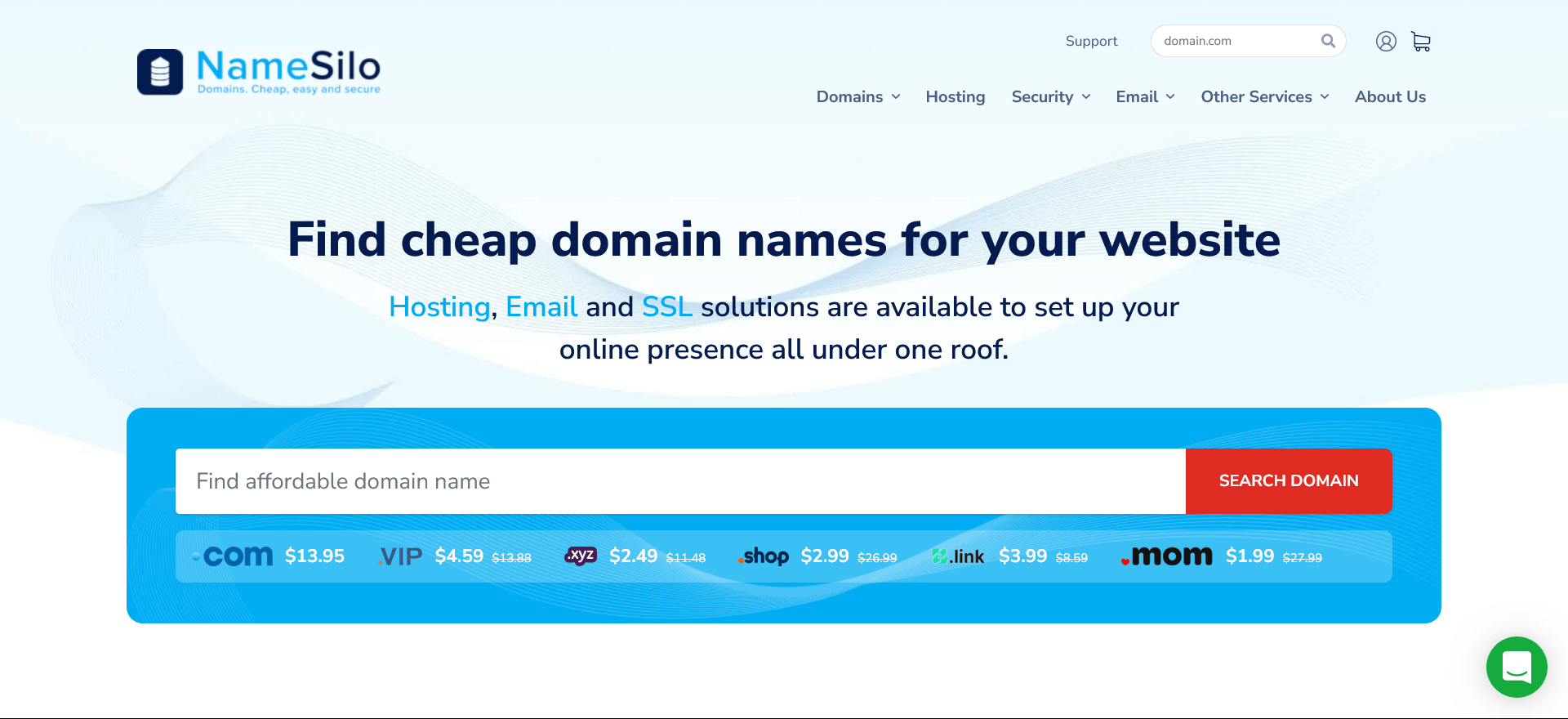
| TLDs | New Domain Price | Renewal Price |
| .com | $13.95 | $13.95 |
| .in | $7.25 | $7.25 |
| .org | $10.79 | $9.49 |
| .net | $15.95 | $15.95 |
| .xyz | $2.49 | $11.48 |
- Affordable Pricing: NameSilo is known for its transparent and competitive pricing structure. Unlike some registrars that lure customers with low introductory prices only to hike rates during renewal, NameSilo maintains consistent and affordable pricing. They offer one of the lowest prices for domain registrations and renewals in the industry.
- Free WHOIS Privacy: Privacy is a significant concern for many domain owners. NameSilo includes free WHOIS privacy with all domains, protecting your personal information from being publicly accessible. This feature is a huge plus as other registrars often charge extra for it.
- No Hidden Fees: Transparency is a key value at NameSilo. There are no hidden fees or surprise charges. What you see is what you get, which helps in budgeting and financial planning.
- User-Friendly Interface: The NameSilo interface is clean, straightforward, and easy to navigate. Whether you’re a novice or an experienced webmaster, you’ll find managing your domains and other services intuitive.
- Bulk Domain Management: For users with multiple domains, NameSilo’s bulk management tools are invaluable. They allow you to manage all your domains efficiently, saving time and effort.
- Robust Security Features: Security is a top priority at NameSilo. They offer features like DNSSEC, domain locking, and two-factor authentication to ensure your domains are protected against unauthorized changes and cyber threats.
- Excellent Customer Support: NameSilo has a reputation for responsive and helpful customer support. They provide 24/7 support through various channels, including live chat, email, and an extensive knowledge base.
- Marketplace for Buying and Selling Domains: The NameSilo marketplace allows users to buy and sell domains easily. This feature is particularly useful for domain investors and those looking to acquire premium domains.
- Lack of Marketing Tools: Unlike some competitors, NameSilo doesn’t offer a comprehensive suite of marketing tools. Users looking for SEO tools, advertising credits, or advanced analytics may need to use external services.
- No Phone Support: Although their customer support is generally excellent, NameSilo does not offer phone support. This might be a drawback for users who prefer speaking to a support agent directly.
Discount: Extra $1 OFF
Promo Code: TLEXTRA, NAMEBOTAI
4. GoDaddy
GoDaddy is one of the most well-known names in the domain name registrar and web hosting industry. With millions of domains under management, it has established itself as a go-to service for individuals and businesses looking to establish their online presence. However, like any service, it has its advantages and disadvantages.
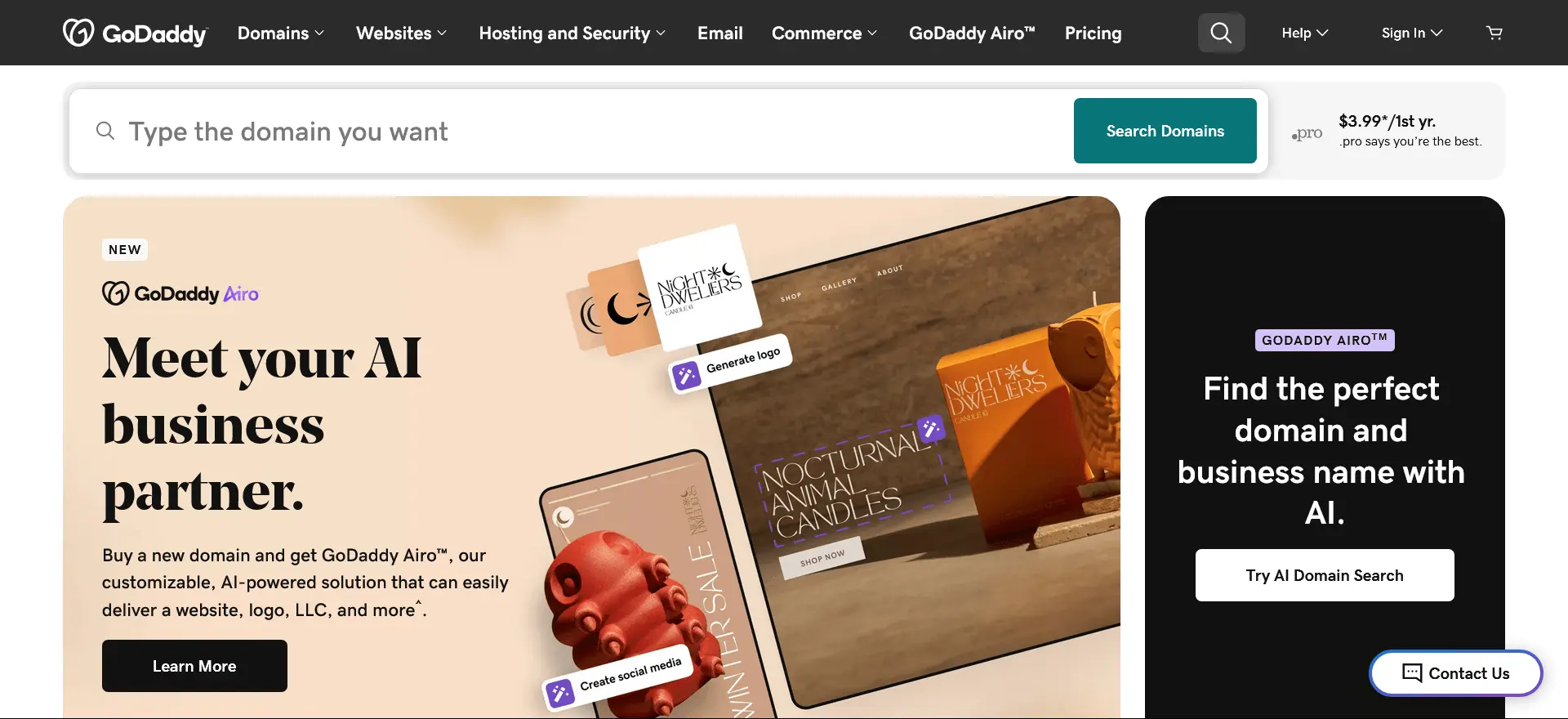
| TLDs | New Domain Price | Renewal Price |
| .com | $0.01 | $21.99 |
| .in | $12.99 | $12.99 |
| .org | $9.99 | $22.99 |
| .net | $0.01 | $24.99 |
| .xyz | $0.99 | $19.99 |
- User-Friendly Interface: GoDaddy offers a highly intuitive and easy-to-navigate interface. Whether you are a beginner or an experienced webmaster, you’ll find the platform straightforward, making domain registration and management a breeze.
- Extensive Domain Options: GoDaddy boasts a vast selection of domain name extensions beyond the common .com, .net, and .org. This extensive variety allows you to find the perfect domain that suits your brand and purpose.
- Competitive Pricing: GoDaddy often provides attractive introductory pricing for new domains. They also frequently offer discounts and promotions, which can be particularly appealing for new businesses or startups working within a budget.
- Comprehensive Customer Support: With 24/7 customer support via phone and chat, GoDaddy ensures that help is always available. Their knowledgeable support team can assist with a wide range of issues, from domain registration to technical support for their hosting services.
- Additional Services: Beyond domain registration, GoDaddy offers a suite of additional services, including web hosting, SSL certificates, email hosting, and website building tools. This makes it a convenient one-stop-shop for all your web needs.
- High Renewal Rates: While GoDaddy’s initial registration prices are competitive, their renewal rates can be significantly higher. This is something to consider when budgeting for your website over the long term.
- Upselling Practices: GoDaddy is known for its aggressive upselling during the checkout process. Users might find the numerous add-ons and optional features overwhelming and might inadvertently purchase services they do not need.
- Interface Overload: Despite its user-friendly design, some users find GoDaddy’s interface cluttered with too many options and advertisements for additional services. This can make the process of managing your domains more cumbersome than necessary.
- Mixed Customer Support Reviews: While GoDaddy offers comprehensive support, customer experiences can be inconsistent. Some users report long wait times and varying levels of helpfulness depending on the representative they connect with.
- Privacy Protection Costs Extra: Unlike some competitors that include domain privacy protection in their standard pricing, GoDaddy charges an additional fee for this service. Domain privacy is crucial for protecting your personal information, so this extra cost can be a downside.
5. BigRock
BigRock has emerged as a notable player, particularly in India. Catering to a wide range of clients, from small businesses to large enterprises, BigRock offers a solid solution for domain name registrar and management, particularly for small to medium-sized businesses. Its affordability, user-friendly interface, and comprehensive customer support make it a viable choice for many. However, potential users should be aware of the higher renewal rates, upselling tactics, and the potential need for additional features as their business grows.
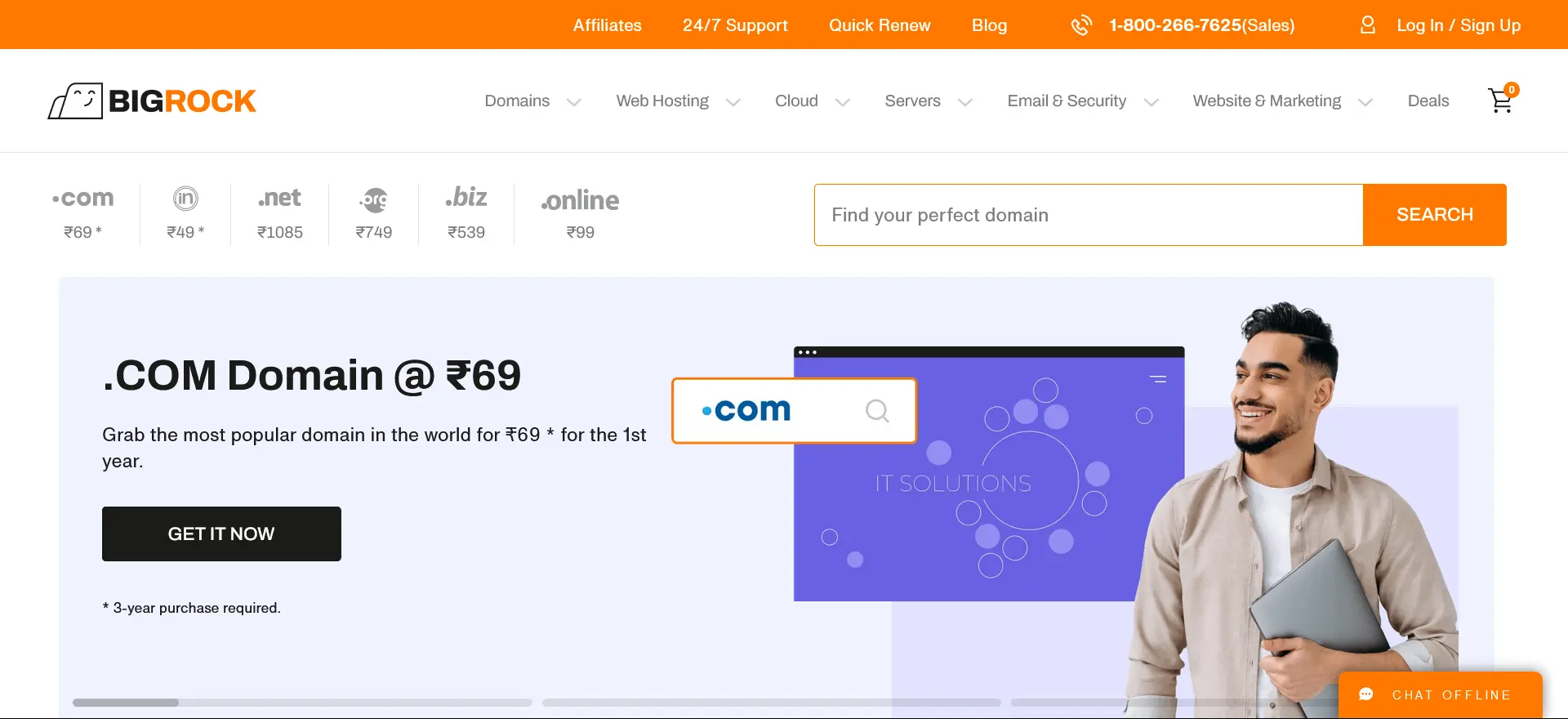
| TLDs | New Domain Price | Renewal Price |
| .com | ₹69.00 | ₹909.00 |
| .in | ₹49.00 | ₹579.00 |
| .org | ₹749.00 | ₹999.00 |
| .net | ₹1085.00 | ₹1085.00 |
| .xyz | ₹169.00 | ₹659.00 |
- Affordable Pricing: BigRock is known for its competitive pricing, making it an attractive option for startups and small businesses. They frequently offer discounts and promotions, allowing customers to secure domains at reduced rates.
- User-Friendly Interface: The platform is designed with usability in mind. The domain registration process is straightforward, and managing domains through the control panel is intuitive, even for those with limited technical expertise.
- Wide Range of Services: Beyond domain registration, BigRock provides a comprehensive suite of services including web hosting, email hosting, website builder tools, and SSL certificates. This makes it a one-stop-shop for establishing an online presence.
- Strong Customer Support: BigRock offers 24/7 customer support through various channels, including live chat, email, and phone. Their support team is generally responsive and helpful, which is crucial for resolving any issues that might arise.
- Variety of Domain Extensions: BigRock supports a wide array of domain extensions, from the common .com and .net to country-specific and niche extensions. This variety allows users to choose a domain that best fits their brand and target audience.
- Upselling Tactics: While BigRock’s pricing is attractive, they are known for upselling additional services during the checkout process. This can be overwhelming for new users who might end up purchasing services they don’t necessarily need.
- Renewal Rates: Initial discounts can be enticing, but renewal rates are often significantly higher. It’s essential to read the fine print and be prepared for the increased costs after the first year.
- Limited Advanced Features: For advanced users or larger businesses with complex needs, BigRock’s features might feel somewhat limited. They provide the basics effectively, but high-demand users might find the lack of advanced customization options a drawback.
- Mixed Reviews on Uptime: While many users report satisfactory uptime, there are occasional complaints about downtime and server reliability. For businesses where uptime is critical, this can be a concern.
- Extra Costs for Privacy Protection: Domain privacy protection, which hides your personal information from the public WHOIS database, is not included with domain registration and comes at an additional cost. This is a standard practice in the industry, but it’s worth noting as an extra expense.
6. Hostinger
Hostinger, is a solid choice for domain name registrar and management, especially for those who prioritize affordability and ease of use. Its integrated services and customer support are notable strengths. However, potential users should be aware of higher renewal costs and the limited TLD options. Advanced users may also find the DNS features lacking. Overall, Hostinger offers a good balance of price and functionality, making it a popular choice for many website owners.
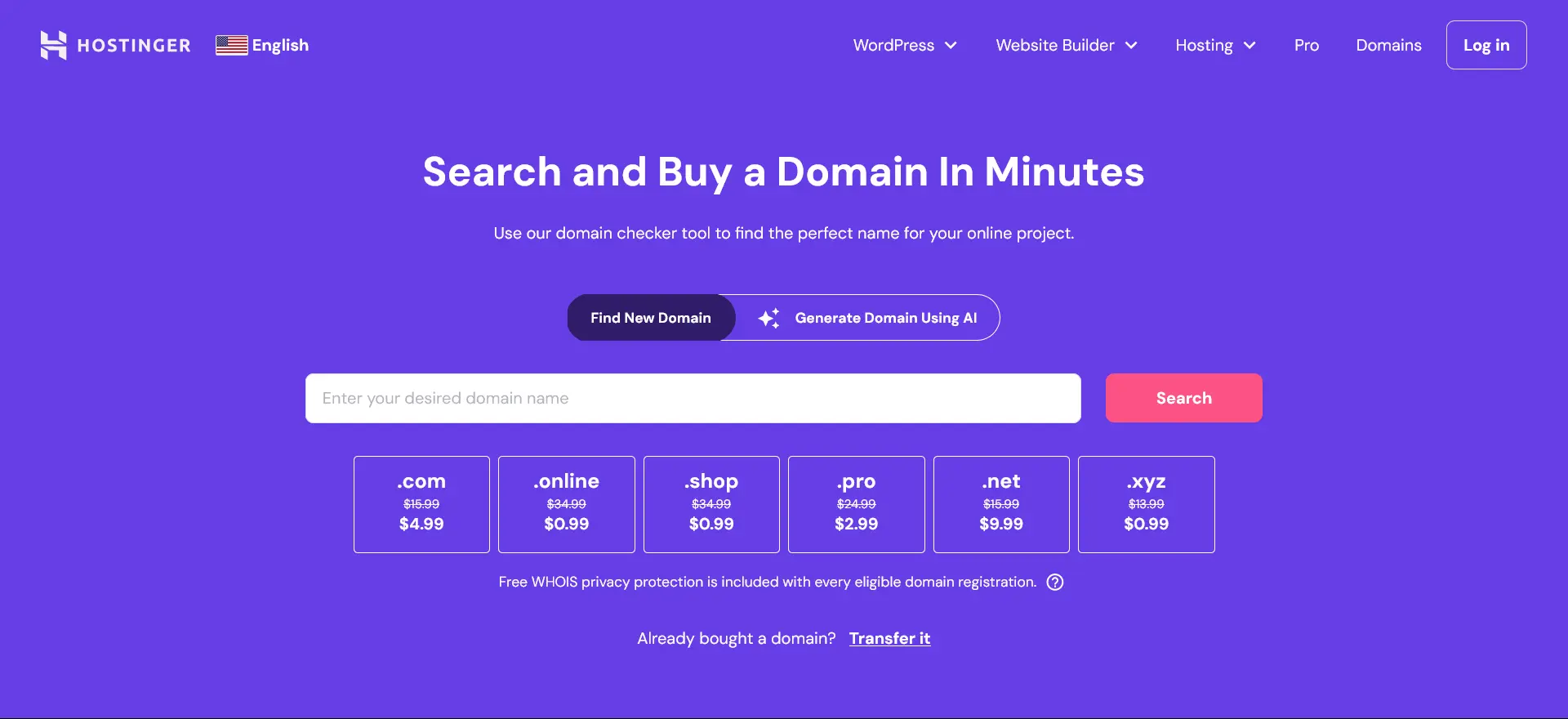
| TLDs | New Domain Price | Renewal Price |
| .com | $9.99 | $15.99 |
| .in | $2.99 | $9.99 |
| .org | $7.99 | $15.99 |
| .net | $9.99 | $15.99 |
| .xyz | $0.99 | $13.99 |
- Affordability: Hostinger is renowned for its cost-effective solutions. Domain registration prices are competitive, often accompanied by discounts, making it an attractive option for startups and small businesses.
- User-Friendly Interface: The Hostinger dashboard is intuitive and user-friendly. Whether you are a tech novice or a seasoned webmaster, navigating through domain registration, DNS management, and other settings is straightforward.
- Integrated Hosting and Domain Services: Hostinger provides a seamless integration of domain registration and web hosting services. This all-in-one approach simplifies the process of managing your website, as everything is housed under one roof.
- Free Domain with Hosting Plans: Many of Hostinger’s hosting plans come with a free domain for the first year, adding extra value for those who are just starting their online journey.
- Customer Support: Hostinger offers 24/7 customer support through live chat. Their support team is generally responsive and knowledgeable, helping to resolve any issues quickly.
- Renewal Costs: While the initial domain registration prices are low, renewal costs can be significantly higher. It’s essential to check the renewal rates before making a long-term commitment.
- Limited TLD Options: Hostinger offers a variety of top-level domains (TLDs), but the selection is not as extensive as some other domain registrars. If you are looking for a specific or less common TLD, you might need to look elsewhere.
- Upselling Tactics: During the checkout process, Hostinger often tries to upsell additional services such as SSL certificates and SEO tools. This can be a bit overwhelming for users who only need basic domain registration.
- Lack of Advanced DNS Features: For advanced users, the DNS management features provided by Hostinger might feel somewhat limited. Those who require more sophisticated DNS configurations may find it lacking compared to specialized DNS providers.
- No Phone Support: While the live chat support is efficient, some users prefer having the option to speak to a support representative over the phone, which Hostinger currently does not offer.
7. IONOS (by 1&1)
IONOS is a robust and reliable option for domain name registrar and management, offering a wide range of services that can cater to various needs. Its competitive pricing, comprehensive service offerings, and reliable support make it a strong contender in the market. However, potential customers should be aware of its complex pricing structure and upselling tactics. By weighing these pros and cons, users can make an informed decision about whether IONOS is the right fit for their domain management needs.
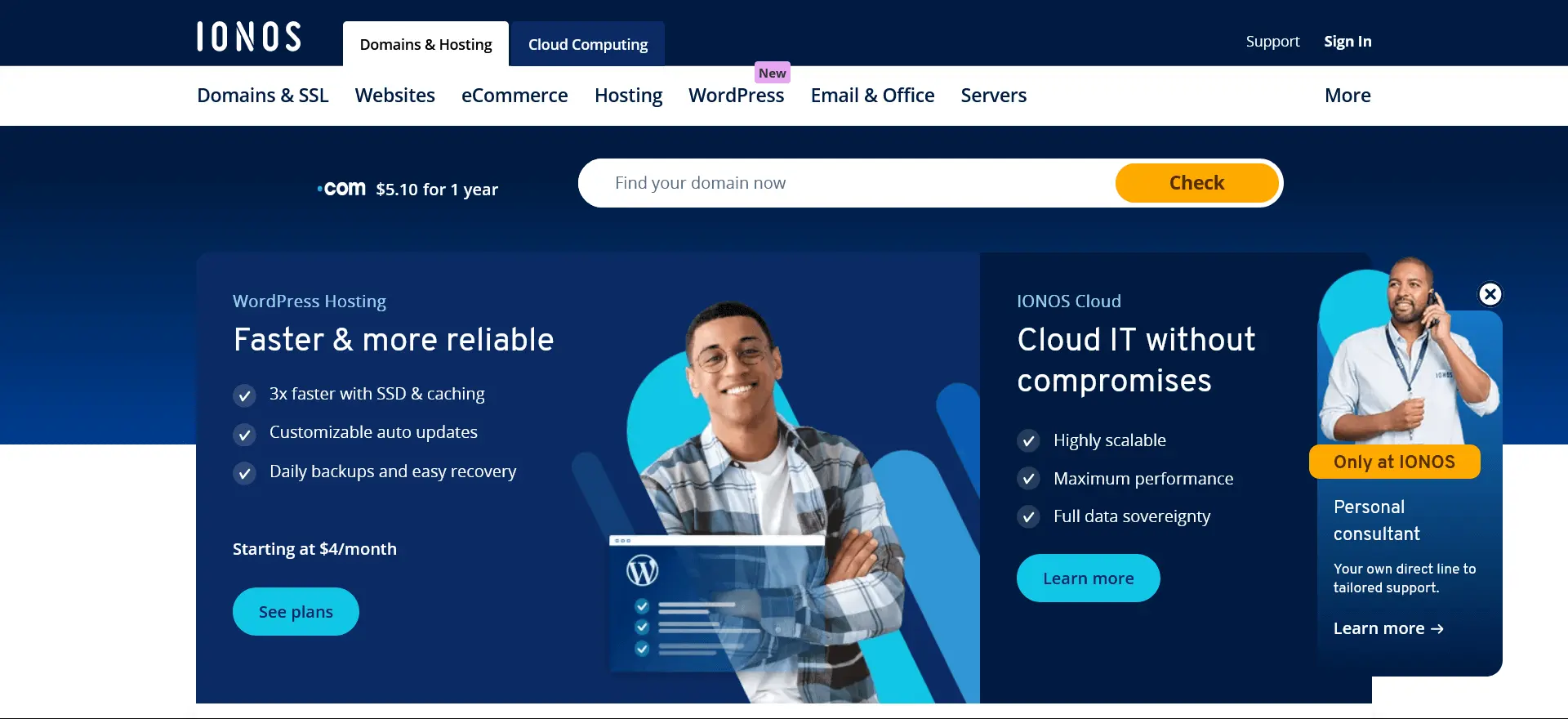
| TLDs | New Domain Price | Renewal Price |
| .com | $5.10 | $17.00 |
| .in | NA | NA |
| .org | $1.00 | $20.00 |
| .net | $1.00 | $20.00 |
| .xyz | $0.75 | $15.00 |
- Comprehensive Services: IONOS provides a full suite of services beyond domain registration, including web hosting, SSL certificates, email hosting, and website builders. This makes it a one-stop-shop for many users.
- User-Friendly Interface: The IONOS interface is designed to be intuitive, making it easier for users to manage their domains. Features like bulk domain management and DNS settings updates are straightforward.
- Competitive Pricing: IONOS offers competitive pricing for domain registrations and renewals. They frequently have promotional offers that can help new users save money.
- Reliable Customer Support: IONOS provides 24/7 customer support through phone, email, and chat. Their support team is known for being responsive and helpful, which is a significant advantage for users who may need assistance.
- Free SSL and WHOIS Privacy: Many of their plans include free SSL certificates and WHOIS privacy protection, adding value and security for users at no additional cost.
- Global Reach: With data centers in Europe and the United States, IONOS offers robust infrastructure that ensures reliable performance and uptime for websites globally.
- Complex Pricing Structure: While the pricing can be competitive, the structure can sometimes be confusing. Renewal rates can be significantly higher than initial registration costs, which may catch some users off guard.
- Upselling Tactics: Users have reported that IONOS can be quite aggressive with upselling additional services during the registration process. This can be overwhelming for those who are only looking to register a domain.
- Interface Learning Curve: Despite being user-friendly, some users might find the IONOS interface to have a slight learning curve, especially if they are not familiar with domain management.
- Limited Free Features on Basic Plans: While IONOS offers many features, some of the more advanced tools and services come at an additional cost. Basic plans may lack certain functionalities that are included in higher-tier plans or with other providers.
- Mixed Customer Reviews: Customer experiences with IONOS vary widely. While many praise their service, others have reported issues with billing practices and support responsiveness.
8. Porkbun
Porkbun is a relatively new player as domain name registrar space, but it has quickly gained a reputation for its affordable pricing and user-friendly services. Whether you’re a seasoned webmaster or just starting your first website, understanding what Porkbun offers can help you decide if it’s the right choice for your domain needs.
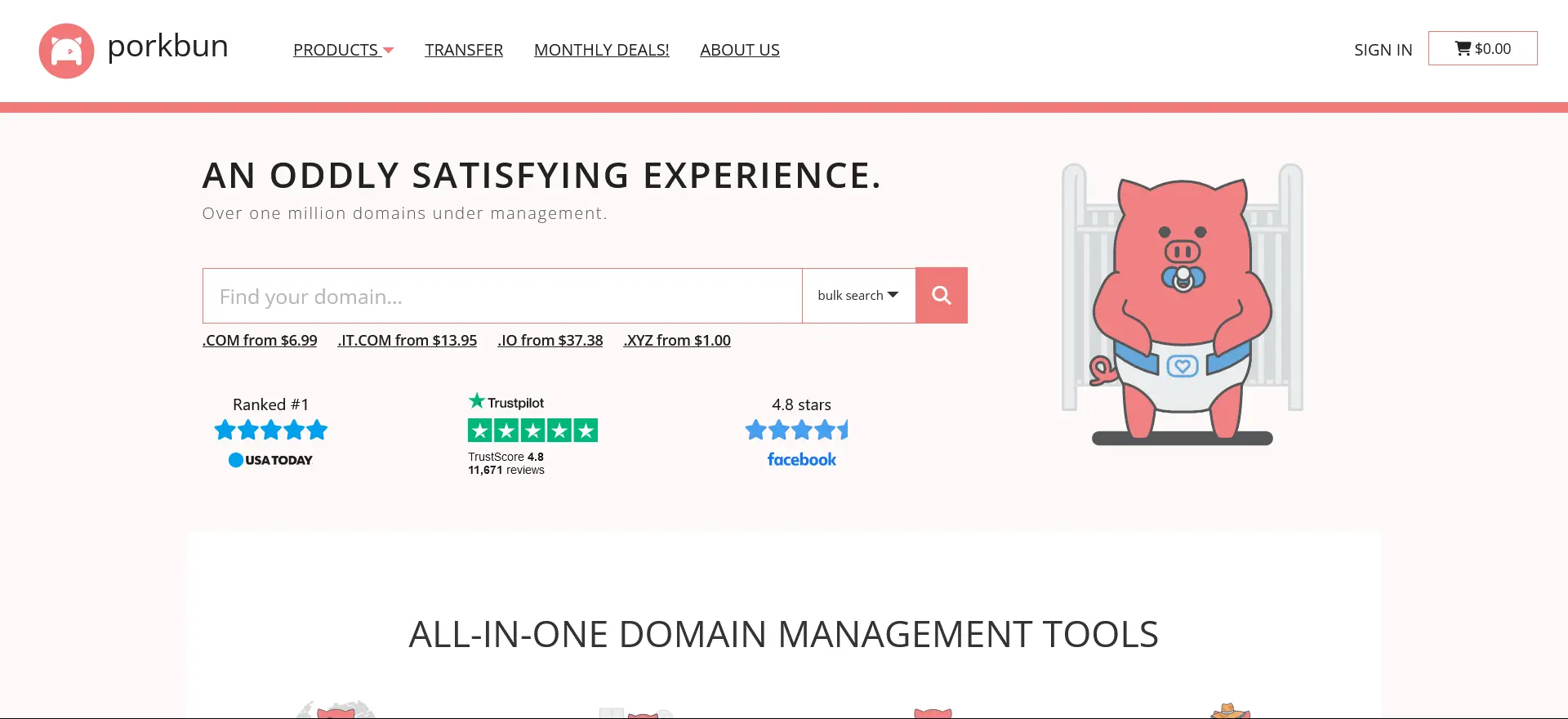
| TLDs | New Domain Price | Renewal Price |
| .com | $6.99 | $10.37 |
| .in | $6.45 | $6.45 |
| .org | $6.60 | $10.72 |
| .net | $12.50 | $12.50 |
| .xyz | $1.00 | $10.79 |
- Competitive Pricing: Porkbun stands out for its low-cost domain registrations. They often offer some of the best prices in the industry for both initial registration and renewals. This makes Porkbun an attractive option for individuals and small businesses looking to minimize costs.
- Free WHOIS Privacy: Privacy is a major concern for many domain owners, and Porkbun addresses this by including WHOIS privacy protection for free with every domain registration. This helps keep your personal information private and reduces spam.
- User-Friendly Interface: The Porkbun interface is clean and intuitive, making it easy for users to search for, register, and manage their domains. Even those with little to no experience can navigate the platform with ease.
- Free Email Forwarding: Porkbun includes free email forwarding with its domain registrations. This allows you to create professional email addresses using your domain without additional costs.
- Strong Security Features: Porkbun offers robust security features, including two-factor authentication (2FA) and DNSSEC, to help protect your domains from cyber threats and unauthorized access.
- Excellent Customer Support: Porkbun’s customer support is highly rated for being responsive and helpful. They provide various support channels, including live chat and email, to assist users with their inquiries and issues.
- Limited Add-On Services: While Porkbun excels in domain registration and management, it offers fewer additional services compared to some larger competitors. For example, they don’t provide web hosting, which means you’ll need to look elsewhere for that service.
- Newer in the Market: As a newer company, Porkbun doesn’t have the same long-standing reputation as some of the more established registrars. While they’ve built a positive reputation quickly, they lack the extensive track record that might provide extra assurance for some users.
- User Interface Simplicity: While the user-friendly interface is a pro for beginners, advanced users might find the lack of more complex features and options a downside. Power users who need advanced domain management tools might find Porkbun’s offerings somewhat limited.
- Upselling of Premium Domains: Porkbun, like many registrars, actively promotes premium domain names. These can be significantly more expensive than standard domains, which might be off-putting for some users.
- Limited TLD Variety: Although Porkbun offers a wide range of top-level domains (TLDs), their selection might not be as extensive as that of some larger registrars. If you’re looking for a very specific or obscure TLD, you might need to look elsewhere.
9. Cloudflare
Cloudflare Domain Registrar offers excellent value, especially for those already using its other services. Its competitive pricing, robust security, and reliable infrastructure make it an attractive option. However, the limited domain management features and lack of hosting services might not meet the needs of all users. As always, weigh the pros and cons against your specific requirements to make the best choice for your domain registration needs.
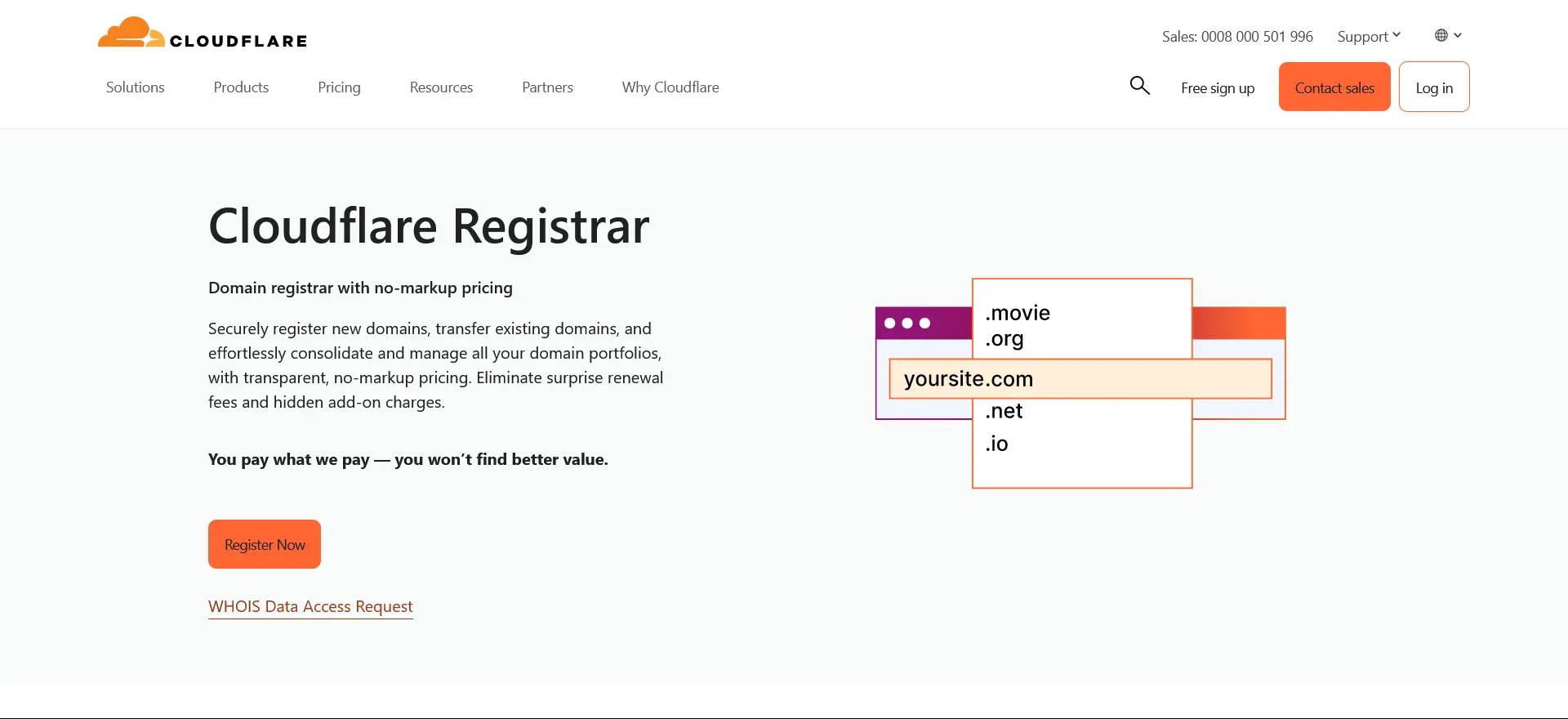
| TLDs | New Domain Price | Renewal Price |
| .com | $9.77 | |
| .in | ||
| .org | $7.50 | |
| .net | $11.84 | |
| .xyz |
- Competitive Pricing: Cloudflare offers domains at wholesale prices with no markup. This means you pay exactly what they pay to the registries, making it one of the most cost-effective options available.
- Enhanced Security: One of Cloudflare’s key strengths is security. By using Cloudflare as your domain registrar, you get access to advanced security features such as two-factor authentication (2FA), DNSSEC, and DDoS protection.
- Integrated Services: Cloudflare’s ecosystem offers a suite of integrated services, including CDN, DNS, and web security features. This seamless integration can simplify the management of your online presence and improve your website’s performance and security.
- Transparent Pricing: Cloudflare is known for its transparency. There are no hidden fees or upsells, so you always know exactly what you’re paying for.
- Reliability: With Cloudflare’s robust infrastructure, you benefit from high uptime and reliability, which are crucial for maintaining a consistent online presence.
- Limited Domain Management Features: Compared to traditional domain registrars, Cloudflare may lack some advanced domain management features. For instance, it does not support email forwarding, which might be a dealbreaker for some users.
- Limited TLDs: Cloudflare Domain Registrar supports a wide range of top-level domains (TLDs), but it doesn’t cover as many TLDs as some of the larger, more established registrars. If you need a less common TLD, you might need to look elsewhere.
- No Web Hosting: Cloudflare focuses on domain registration and security services, so it does not offer web hosting. You’ll need to manage your hosting separately, which can be less convenient if you prefer an all-in-one solution.
- Potential Over-Reliance: Relying on Cloudflare for both your domain registration and DNS services could pose a risk if Cloudflare experiences an outage. Diversifying your services across different providers can sometimes be a safer strategy.
- Customer Support Limitations: While Cloudflare offers support, it may not be as personalized or as extensive as that provided by some dedicated domain registrars. If you require extensive customer support, you might find Cloudflare’s offerings a bit limited.
10. Domain
Domain.com is a solid choice for domain registration and management, offering a user-friendly experience, a wide range of domain extensions, and reliable customer support. However, potential users should be mindful of the higher renewal rates, upselling tactics, and additional costs for certain features. Overall, it’s a robust platform that can effectively meet your domain needs, provided you’re aware of and prepared for the extra costs involved.
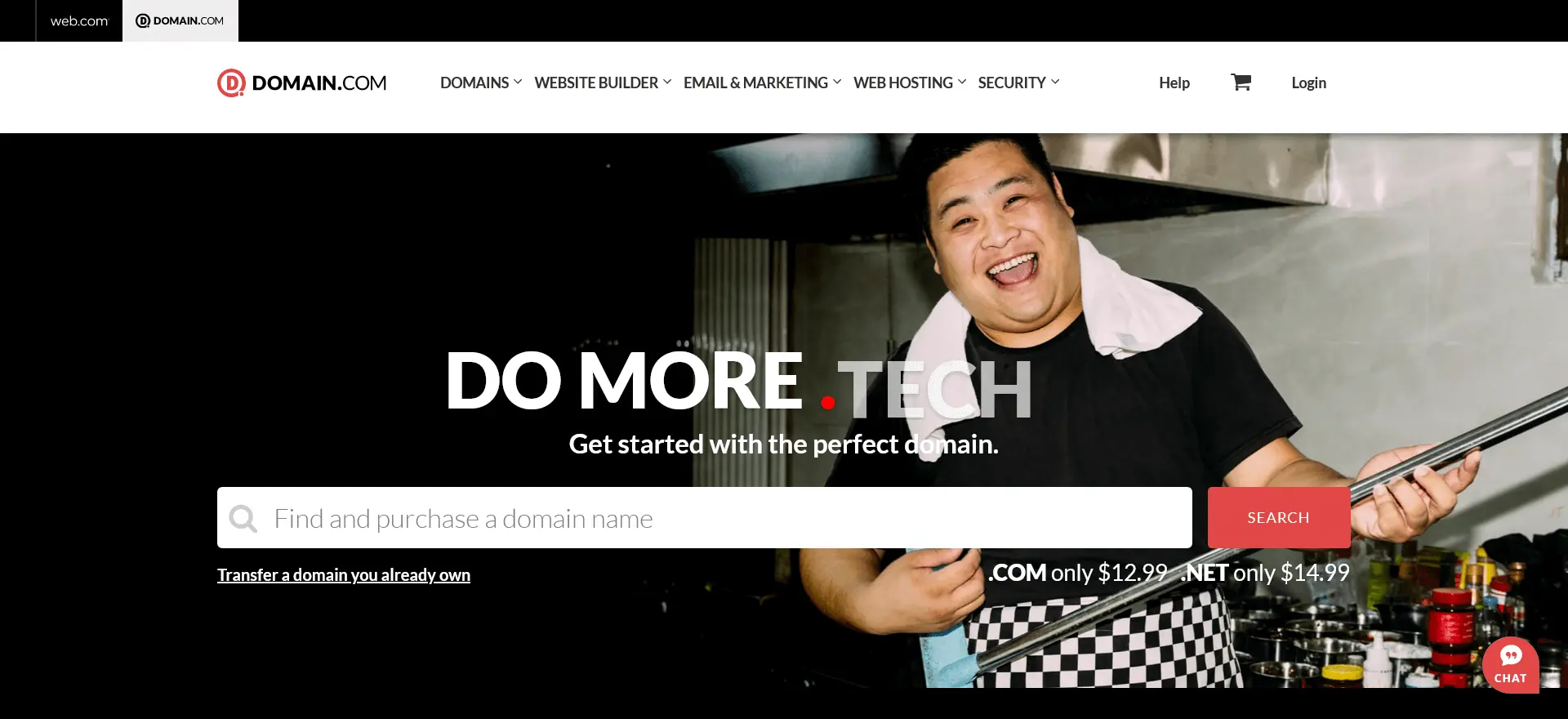
| TLDs | New Domain Price | Renewal Price |
| .com | $13.17 | |
| .in | $13.17 | |
| .org | $14.99 | |
| .net | $14.99 | |
| .xyz | $11.99 |
- User-Friendly Interface: Domain.com is known for its easy-to-navigate interface. Whether you’re a tech-savvy user or a beginner, you’ll find the process of registering a domain straightforward. The platform offers step-by-step guidance, making it easy to find and purchase your desired domain name.
- Wide Range of Domain Extensions: With Domain.com, you have access to a vast array of domain extensions beyond the traditional .com, .net, and .org. This includes newer, niche extensions like .tech, .store, and .blog, allowing for more creative and relevant domain names for your business or personal site.
- Affordable Pricing: Domain.com offers competitive pricing for both initial domain registration and renewal. Additionally, they frequently provide discounts and promotions, making it an attractive option for those looking to save on domain costs.
- Bundled Services: Beyond domain registration, Domain.com offers a variety of bundled services, including web hosting, website builders, and email hosting. This can be particularly beneficial for users looking to manage all their online services under one roof.
- Reliable Customer Support: Domain.com provides customer support through various channels, including phone, live chat, and email. Their support team is known for being responsive and helpful, which is crucial when resolving domain-related issues.
- Upselling of Additional Services: While Domain.com offers many services, users might find the constant upselling of additional features like privacy protection, SSL certificates, and web hosting somewhat overwhelming. These extra services can add up, increasing the overall cost.
- Higher Renewal Rates: Although initial registration prices are competitive, some users have reported that renewal rates can be significantly higher. This is a common practice among domain registrars, but it’s something to be aware of when budgeting for your domain expenses.
- Limited Free Features: Domain.com does not offer as many free features as some competitors. For example, privacy protection, which is free with some registrars, often comes at an additional cost with Domain.com. This can make the total cost higher if you require these services.
- No Free Email Hosting: Unlike some competitors, Domain.com does not include free email hosting with domain registration. If professional email addresses are a necessity for you, this could mean an additional expense.
- Occasional Technical Issues: Some users have reported occasional technical issues with Domain.com’s management dashboard. These issues can be frustrating when they occur, though they are generally resolved quickly by the support team.
Conclusion
Choosing the best domain registrar depends on your specific needs, budget, and level of expertise. Each registrar offers unique features, pricing structures, and customer support levels that can significantly impact your experience. Whether you prioritize competitive pricing, robust domain management tools, or excellent customer support, there’s a registrar on this list that can meet your requirements.
When selecting a domain registrar in 2025, consider factors such as pricing transparency, additional services, customer support quality, and ease of use. Remember to review renewal rates as they can vary and significantly impact your long-term costs. By making an informed decision based on your needs, you can ensure a smooth and successful experience establishing your online presence.
Research each registrar further to determine which aligns best with your goals, and don’t hesitate to reach out to their customer support teams if you have specific questions or concerns. Your domain name is the foundation of your online identity, so choosing the right registrar is an important first step towards building your presence on the web.

